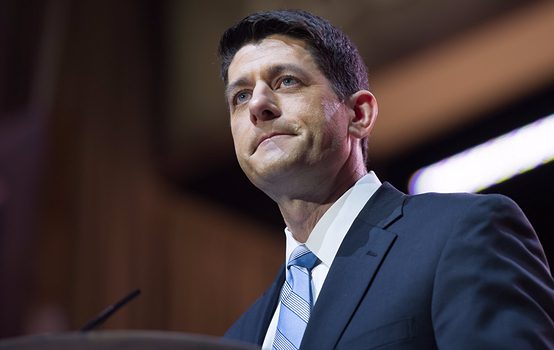Paul Ryan: The Pupil Who Outshone the Teacher

There was a moment in Iowa in 2012 when Paul Ryan seemed to make his breakthrough.
An angry voter confronted former House speaker Newt Gingrich, then running for the Republican presidential nomination, over his comments that Ryan’s blueprint for reforming entitlements constituted “right-wing social engineering.” The Iowan promptly let Newt have it.
“What you did to Paul Ryan was unforgivable,” the voter fumed to Gingrich. “You’re an embarrassment!”
It appeared to signal that midway through the Tea Party era Ryan’s moment had arrived, that he was now a figure with genuine grassroots appeal as opposed to simply a favorite of conservative elites. His fiscal roadmap couldn’t be criticized casually, even by a hero of the last war, the 1994 “Republican revolution.”
Why does that matter? The list of Republican political figures who have been celebrated by conservative elites but have ultimately failed to win the right election or close the deal with rank-and-file GOP voters is long: former Colorado governor Bill Owens, California gubernatorial candidate Bill Simon, former Jersey City mayor Bret Schundler, longtime Wisconsin governor Tommy Thompson—all celebrated in magazine profiles as conservatism’s future in their prime, most of them now largely forgotten.
Even Ryan’s mentor Jack Kemp, once described by David Frum as the James Blaine of the 20th century, never reached his full potential in his own right. An important conservative lawmaker, he peaked as chairman of the House Republican Conference, never served in the majority, ran one lackluster campaign for the GOP presidential nomination, became a lower-tier Cabinet secretary, and closed out his career as vice presidential nominee on an essentially doomed ticket.
By contrast, Ryan was in the majority for all but four years of his time in Congress. He chaired two important committees before reluctantly assuming the speaker’s gavel. He was nominated for vice president on a competitive, if ultimately unsuccessful, Republican ticket in a campaign that did not halt his rise through the leadership ranks.
The tax cut Kemp helped shape was economically more consequential than the recently enacted GOP tax law is likely to be. But when it comes to his political ascent, the pupil did in many ways outshine the teacher.
Yet Ryan’s career ended up being an inside Washington game more than a grassroots phenomenon. Nothing wrong with that necessarily. Ryan’s goal was to shape policy and legislation, not fire up rally attendees. For all the criticism he gets from those who claim he “appeased” President Trump, Ryan still drove the Republican agenda throughout most of 2017 to a greater extent than any other single figure.
It does, however, make some of the Ryan-induced shifts in Republican thinking about entitlement spending and the debt look more temporary than they appeared when Barack Obama was president. The buy-in from the base on changes to programs that benefit people who work was tenuous at best, a fact Trump exposed on his path through the GOP primaries.
Trump’s nomination was itself a powerful statement on the limits of conservative elite influence on the grassroots. The magazines that unsuccessfully touted the likes of Owens and Schundler as conservative heroes warned Republican voters against Trump. Those voters largely ignored them, just as they did when they were instructed to prefer Phil Gramm to Pat Buchanan or Fred Thompson (and even Mitt Romney) to Mike Huckabee.
But those contests were races for second and even third place in Republican primaries where the frontrunner was considered suboptimal but acceptable. Think Bob Dole, George W. Bush, or John McCain. Trump was an unacceptable frontrunner, being opposed by blue-chip conservatives like Ted Cruz and Marco Rubio, and he won.
That’s why the Trump presidency has been such a discombobulating, even disillusioning, experience for a large subset of conservative elites. It has reminded them that populism, nationalism, and anti-liberal signaling all have more purchase with Republican voters than they’d previously thought—perhaps more than ideals of fiscal responsibility and limited government, certainly more than specific proposals to convert Medicare into a premium support system.
The end of Ryan’s speakership reinforces the trends that discomfit these conservatives so. Their ideas have much more of an institutional framework and far more programmatic coherence than inchoate Trumpism. But you still need the angry Iowa Republican voters on your side.
W. James Antle III is politics editor of the Washington Examiner and author of Devouring Freedom: Can Big Government Ever Be Stopped?
Comments